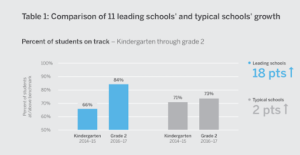Research shows that students who do not read proficiently by the end of third grade are four times more likely to drop out of high school than their peers who are proficient readers. This is because, at the fourth-grade level, students are ideally no longer learning to read but rather “reading to learn.”
When focusing on driving success in K-2 literacy, it is not just the educators who need to push towards their goals, but district and school leaders too. In Best Practices of Literacy Leaders: Keys to School Improvement, Rita Bean states, “Given that literacy is a critical key to future success, all school personnel need to understand how they can support students’ literacy learning.” When district leaders are involved in the literacy education process and participate in literacy professional development along with their educators, they are more aware of the process of early literacy development and how it can be consistent across all their schools.
A 2018 study by experts at Amplify identified a group of 11 schools that varied widely in terms of location, size, educational approach, and socio-economic level. What united these schools in their literacy leadership is the creation of an environment for success and the support they provided with staff, time, and other resources. The diversity of the schools suggests the practices observed are effective enough to meet the needs of schools of all socioeconomic backgrounds.
 After witnessing these schools significantly raise their percentages of students reading at grade level by the end of second grade, Amplify identified 5 essential leadership practices that drive success in K-2 literacy. They are:
After witnessing these schools significantly raise their percentages of students reading at grade level by the end of second grade, Amplify identified 5 essential leadership practices that drive success in K-2 literacy. They are:
Make Early Literacy Priority Numer One
Educators and school leaders should consider literacy fundamental to all other academic subjects. District and school leaders should ensure they are equipping their educators with the practical and applicable knowledge and tools for advancing literacy for all children. These tools should be further supported by daily creative tips and classroom materials that bring literacy to life.
Knowing the district’s literacy goals and seeing that they are carried out is the first task that school leaders take on in making early literacy a top priority. Principals and school leaders should also participate in literacy professional development to expand their knowledge around literacy research and practices that increase literacy achievement.
Treat Reading Instruction Time as Sacred
Leaders and educators should work together on an agreed-upon reading curriculum to guarantee fidelity and consistency in the classroom for better student growth. Educators can work with students to build their literacy skills by setting designated reading blocks.
School leaders and educators should determine a consistent reading schedule and curriculum in classrooms across the same grade level. The schools studied by Amplify scheduled literacy blocks first thing in the morning when teachers could assure their students were looking at everything with a fresh pair of eyes.
Empower Teachers to Own and Lead Intervention
Challenges are always going to arise when it comes to early literacy development. School leaders should provide their educators with the tools they need to assess the strengths and weaknesses of each student. The proper professional development will address assessment and intervention and should empower teachers with a practical and proven reading program they can rapidly implement with confidence, beginning on day one.
Any student issues should be addressed immediately after they are found to provide the appropriate intervention and prevent any potential gaps. School leaders should also understand their educator’s strengths and weaknesses so that they can strategically match students who struggle with a specific task with the educator who is best at teaching it.
Monitor Processes and Data Closely
School leaders should use data to monitor student and school progress towards their specific literacy goals. They should establish processes for data review of efforts to achieve school literacy goals and have checks to ensure these processes are in use and effective.
School leaders should regularly provide feedback to their educators on ways they can adjust instruction and intervention for students who are at risk. They should collaborate with their educators and students’ parents in data review sessions to address issues and develop an action plan to move towards their desired literacy goals. Collaboration in the analysis and review of data provides a safety net for professional development.
Share Granular Data with Students
By providing granular data that showcases a student’s performance, school leaders and educators can work not only with themselves but also with the student and their parents to address critical areas of literacy development. This provides the students with an understanding of what they need to accomplish and can set the stepping stones for how they can get there.
The data that should be shared should be specific and address their:
- Phonemic Awareness Skills
- Alphabetic Principle Understanding
- Fluency
- Accuracy
and/or
- Comprehension
IMSE Impact Structured Literacy Professional Development gives school leaders and their educators the keys to unlocking literacy in their classrooms. Strong leadership, comprehensive data, and a commitment to fidelity and consistency across classrooms enable insight and action for individual students, teachers, and building and district leaders. This results in consistent and impactful reading growth across the entire school district.
Resources:
- https://amplify-com-mktg.imgix.net/app/uploads/2019/02/04161504/Five-leadership-practices-that-drive-success-in-K-2-literacy.pdf
- https://www.guilford.com/excerpts/dagen_ch1.pdf?t
- https://cdn.ymaws.com/www.aleronline.org/resource/resmgr/files/aler_white_paper_on_literacy.pdf
Please connect with us on Facebook, Twitter, Instagram, LinkedIn, and Pinterest to get tips and tricks from your peers and us. Read the IMSE Journal to hear success stories from other schools and districts, and be sure to check out our digital resources for refreshers and tips.
